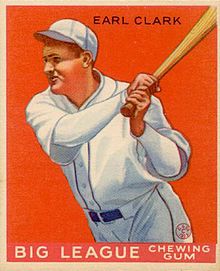Baseball player
| Earl Clark | |
|---|---|
 Earl Clark 1933 Goudey baseball card Earl Clark 1933 Goudey baseball card | |
| Outfielder | |
| Born: (1907-11-06)November 6, 1907 Washington, D.C., U.S. | |
| Died: January 16, 1938(1938-01-16) (aged 30) Washington, D.C., U.S. | |
| Batted: RightThrew: Right | |
| MLB debut | |
| August 17, 1927, for the Boston Braves | |
| Last MLB appearance | |
| May 25, 1934, for the St. Louis Browns | |
| MLB statistics | |
| Batting average | .291 |
| Home runs | 4 |
| Runs batted in | 81 |
| Stats at Baseball Reference | |
| Teams | |
Bailey Earl Clark (November 6, 1907 – January 16, 1938) was an American outfielder in Major League Baseball who played from 1927 through 1934, for the Boston Braves (1927–33) and St. Louis Browns (1934). Listed at 5 feet 10 inches (1.78 m), 160 pounds (73 kg), Clark batted and threw right handed. He was born in Washington, D.C.
Clark set the major league record for putouts by an outfielder in a 9-inning game, with twelve on May 10, 1929. The feat has only been equalled twice; by Lyman Bostock in 1977, and by Jacoby Ellsbury in 2009.
In an eight-year career, Clark posted an average of .291 (240-for-826) with four home runs and 81 runs batted in in 293 games, including 122 runs scored and a .324 on-base percentage.
Clark died at the age of 30 in 1938, when his automobile collided with a streetcar in Washington, D.C.
References
- Baseball Reference – major league career
- ^ "Outfielder Putout Records". Baseball Almanac. Retrieved November 26, 2017.
- "Cincinnati Reds 5, Boston Braves 3". Retrosheet. May 10, 1929.
- "Ex-Ballplayer Dies in Auto Collision". The St. Louis Star and Times. UP. January 17, 1938. Retrieved November 26, 2017 – via newspapers.com.
External links
- Career statistics from Baseball Reference, or Baseball Reference (Minors), or Retrosheet
This biographical article relating to an American baseball outfielder born in the 1900s is a stub. You can help Misplaced Pages by expanding it. |